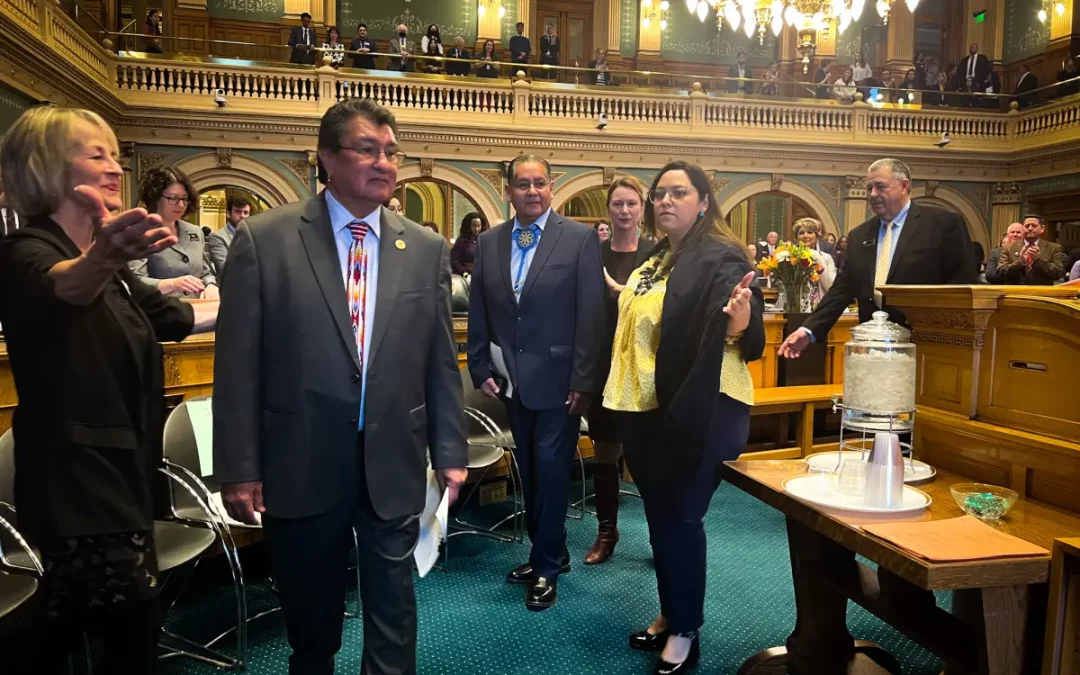The Southern Ute Indian Tribe is suing Gov. Jared Polis and the director of the Colorado Division of Gaming, Christopher Schroder, saying the administration is illegally freezing tribes out of the online sports betting market, in part, to maximize state tax collections.
The federal lawsuit, filed Tuesday in U.S. District Court in Denver, alleges the state sought to exclude the tribe from internet sports betting by acting in bad faith, using delay tactics and belatedly making legal arguments that conflict with federal law and a state gaming compact with the tribe.
“Enough is enough,” Southern Ute Chairman Melvin Baker told Colorado lawmakers during an American Indian Affairs Interim Study Committee meeting Monday. “Litigation is not something we like to do. We like to resolve our differences amicably. We have spent years trying to do so, but here, we have no choice.”
Colorado voters approved sports betting, both at casinos and online, by a narrow margin in 2019. The ballot measure authorized the state of Colorado to levy a 10% tax on sports betting operations and to use most of the money to fund Colorado water projects, like conservation programs, habitat and stream restoration projects, water plans and storage efforts.
Colorado needs between $1.6 billion and $6.1 billion in funding over the next 30 years to tackle a long list of water projects. But its current funding is falling short, leaving a funding gap of $1.5 billion, or about $50 million per year through 2050, according to the 2023 Colorado Water Plan.
Tax collections from sports betting offered a new way to pay for these projects. Wagers totalled about $13 billion between 2020 and 2023. Total tax collections? About $47 million for water projects and other funding pots, according to the state Department of Revenue’s 2023 report.
That funding source is primed to grow. Under the current sports gaming law, the state cannot collect revenues in excess of $29 million. If voters approve a new ballot measure in November, that cap would be removed, potentially generating millions of dollars more for water programs.
But after four years, no Native-owned businesses or casinos are offering online sports betting, even as big dollars roll in for nontribal sports gaming companies and the market becomes more saturated, according to the tribe.
That is because the state has withheld its authorization of tribal online sports betting, keeping the Southern Ute and Ute Mountain Ute tribes out of the game for years longer than others, the lawsuit claims.
In June, the U.S. Supreme Court handed a victory to the Seminole Tribe of Florida, rejecting a challenge to the tribe’s exclusive rights to handle online sports betting across the state, Baker said Monday.
“Any legal objection to the Southern Ute and Ute Mountain Ute engaging in statewide sports betting is gone, but as of last week, the [Polis] administration refused to budge,” he said.
The Colorado Governor’s Office declined to comment on the pending litigation Wednesday.
“The Colorado Gaming Association is reviewing the lawsuit, and we anticipate monitoring this litigation when the governor’s office and the Division of Gaming file their answers,” said Peggi O’Keefe, spokeswoman for the association. Tribal casinos are not members of the association.
What’s in the Southern Ute lawsuit?
According to the lawsuit, the state did not mention any concerns about tribal sports betting, or make an effort to meet with the tribe until April 2020, days before the sports betting law went into effect May 1. That was bad faith, the tribe says.
Weeks later, on May 17, 2020, the state said the tribe needed to secure a state license from the Colorado Gaming Commission to run its sports betting operation, SkyUte Sportsbook.
Requiring a state license violates a 1988 federal law, the Indian Gaming Regulatory Act, which says tribes are subordinate to the federal government, not states, according to the lawsuit. States have limited involvement in tribal gaming but no regulatory power over tribes.
The Polis administration pressured the tribe’s principal vendor by threatening its Colorado licensure, the lawsuit said.
“This attempt to bring tribal gaming under state regulation is illegal, offensive and pointless,” the lawsuit says.
It also alleges the state’s position is motivated by money — specifically the 10% tax on sports betting.
The tribe has authority over its own gaming operations and can conduct gaming as long as it mirrors the gaming activities and bet amounts that are legal in Colorado, according to a 1995 gaming compact between Colorado and the Southern Ute Indian Tribe. That includes sports betting, both online and in person, the tribe argues.
The agreement also ensures the tribe can retain all proceeds from gaming — i.e. under federal law, the tribes are not subject to the state tax. (Tribes do have to comply with federal restrictions that require gaming revenue to be used for government functions and public services.)
As a result, Colorado officials have worried that non-Native gaming companies could relocate to tribal lands to avoid the 10% tax, reducing funds available for water projects.
“The anti-sovereignty approach of defendants — seeking to unlawfully control the tribe’s governmental activities and control the use of the tribe’s money — is shocking and entirely unjustified,” the lawsuit says.
The tribe wants a declaration that its sports betting rules — including internet-based, off-reservation sports betting regulated by the rules — are fully compliant with federal and state law.
It also wants an injunction against further interference by the Polis administration and an order enjoining continuing bad faith negotiations by the governor.
“Polis has sought to manipulate the market so he can extract the maximum amount of taxes from sports betting activities with no care, concern or respect for the negative economic consequences for Colorado’s tribal communities,” the lawsuit says.
Fresh Water News Editor Jerd Smith contributed to this report.



 Print
Print